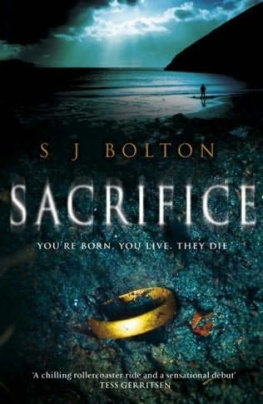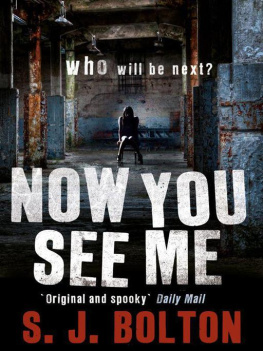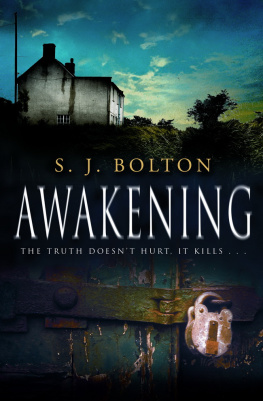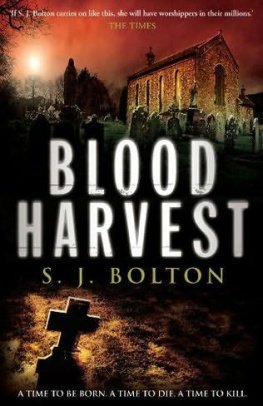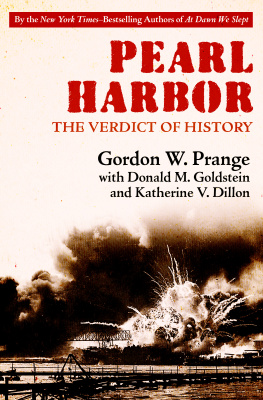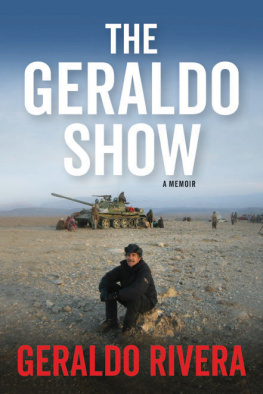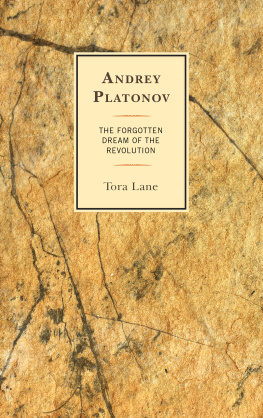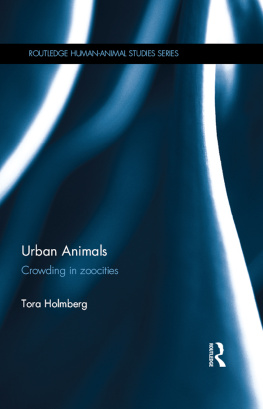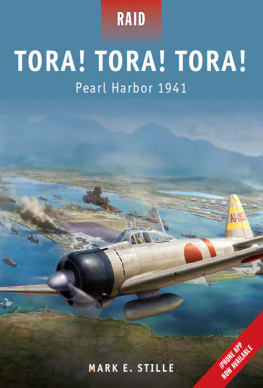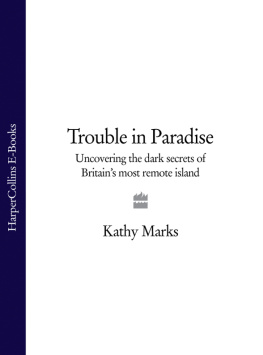Sacrifice www.rbooks.co.ukFor more information about the author, visit her website at www.sjbolton.com
This eBook is copyright material and must not be copied, reproduced, transferred, distributed, leased, licensed or publicly performed or used in any way except as specifically permitted in writing by the publishers, as allowed under the terms and conditions under which it was purchased or as strictly permitted by applicable copyright law. Any unauthorised distribution or use of this text may be a direct infringement of the author's and publisher's rights and those responsible may be liable in law accordingly.ISBN 9781407033532Version 1.0www.randomhouse.co.uk
TRANSWORLD PUBLISHERS 61-63 Uxbridge Road, London W5 5SA A Random House Group Company www.rbooks.co.ukFirst published in Great Britain in 2008 by Bantam Press an imprint of Transworld PublishersCopyright S.J. Bolton 2008S. J. Bolton has asserted her right under the Copyright, Designs and Patents Act 1988 to be identified as the author of this work.This book is a work of fiction and any resemblance to actual persons, living or dead, is purely coincidental.A CIP catalogue record for this book is available from the British Library.ISBNs 9780593059111 (hb) 9780593059128 (tpb)This electronic book is sold subject to the condition that it shall not by way of trade or otherwise, be lent, resold, hired out, or otherwise circulated without the publisher's prior consent in any form other than that in which it is published and without a similar condition including this condition being imposed on the subsequent purchaserAddresses for Random House Group Ltd companies outside the UK can be found at: www.randomhouse.co.uk The Random House Group Ltd Reg. No. 954009ISBN: 9781407033532Version 1.0
For Andrew, who makes everything possible; and for Hal, who makes it worthwhile.
Author's Note Sacrifice is a work of the imagination, inspired by Shetland legend. Whilst I used common Shetland surnames for authenticity, none of the Shetland characters in my book is based on any real person, living or dead. The Franklin Stone Hospital is not intended to be the Gilbert Bain, and Tronal island, as I have described it, does not exist.I have no reason to believe that any of the events in my book have ever taken place on Shetland.
'There are nights when the wolves are silent and only the moon howls.'George Carlin
THE CORPSE I COULD COPE WITH. IT WAS THE CONTEXT THAT threw me.We who make our living from the frailties of the human body accept, almost as part of our terms and conditions, an ever- increasing familiarity with death. For most people, an element of mystery shrouds the departure of the soul from its earthly home of bone, muscle, fat and sinew. For us, the business of death and decay is gradually but relentlessly stripped bare, beginning with the introductory anatomy lesson and our first glimpse of human forms draped under white sheets in a room gleaming with clinical steel.Over the years, I had seen death, dissected death, smelled death, prodded, weighed and probed death, sometimes even heard death (the soft, whispery sounds a corpse can make as fluids settle) more times than I could count. And I'd become perfectly accustomed to death. I just never expected it to jump out and yell 'Boo!'Someone asked me once, during a pub-lunch debate on the merits of various detective dramas, how I'd react if I came across a real live body. I'd known exactly what he meant and he'd smiled even as the daft words left his mouth. I'd told him I didn't know. But I'd thought about it from time to time. What would I do if Joe Cadaver were to catch me by surprise? Would professional detachment click in, prompting me to check for vitals, make mental notes of condition and surroundings; or would I scream and run?And then came the day I found out.It was just starting to rain as I climbed into the mini-excavator I'd hired that morning. The drops were gentle, almost pleasant, but a dark cloud overhead told me not to expect a light spring shower. We might be in early May but, this far north, heavy rain was still an almost daily occurrence. It struck me that digging in wet conditions might be dangerous, but I started the engine even so.Jamie lay on his side about twenty yards up the hill. Two legs, the right hind and fore, lay along the ground. The left pair stuck out away from his body, each hoof hovering a foot above the turf. Had he been asleep, his pose would have been comic; dead, it was grotesque. Swarms of flies were buzzing around his head and his anus. Decomposition begins at the moment of death and I knew it was already mustering speed inside Jamie. Unseen bacteria would be eating away at his internal organs. Flies would have laid their eggs and within hours the maggots would hatch and start tearing their way through his flesh. To cap it all, a magpie perched on the fence near by, his gaze shifting from Jamie to me.Goddamned bird wants his eyes, I thought, his beautiful, tender brown eyes. I wasn't sure I was up to burying Jamie by myself, but I couldn't just sit by and watch while magpies and maggots turned my best friend into a takeaway.I put my right hand on the throttle and pulled it back to increase the revs. I felt the hydraulics kick in and pushed both steering sticks. The digger lurched forwards and started to climb.Reaching the steeper part of the hill, I calculated quickly. I would need a big hole, at least six, maybe eight feet deep. Jamie was a fair-sized horse, fifteen hands and long in the back. I would have to dig an eight-foot cube on sloping ground. That was a lot of earth, the conditions were far from ideal and I was no digger driver; a twenty-minute lesson in the plant-hire yard and I was on my own. I expected Duncan home in twenty-four hours and I wondered if it might, after all, be better to wait. On the fence-post the magpie smirked and did a cocky little side-step shuffle. I clenched my teeth and pushed the controls forward again.In the paddock to my right, Charles and Henry watched me, their handsome, sad faces drooping over the fence. Some people will tell you that horses are stupid creatures. Never believe it! These noble animals have souls and those two were sharing my pain as the digger and I rolled our way up towards Jamie.Two yards away I stopped and jumped down.Some of the flies had the decency to withdraw to a respectful distance as I knelt down beside Jamie and stroked his black mane. Ten years ago, when he'd been a young horse and I was a house- officer at St Mary's, the love of my life or so I'd thought at the time had dumped me. I'd driven, heart wrenched in two, to my parents' farm in Wiltshire, where Jamie had been stabled. He'd poked his head out of his box when he heard my car. I'd walked over and stroked him gently on the nose before letting my head fall on to his. Half an hour later, his nose was soaked in my tears and he hadn't moved an inch. Had he been physically capable of holding me in his arms, he would have done.Jamie, beautiful Jamie, as fast as the wind and as strong as a tiger. His great, kind heart had finally given up and the last thing I was ever going to be able to do for him was dig a bloody great hole.I climbed back into the digger, raised its arm and lowered the bucket. It came up half-full of earth. Not bad. I swung the digger round, dumped the earth, swung back and performed the same sequence again. This time, the bucket was full of compact, dark- brown soil. When we first came here, Duncan joked that if his new business failed, he could become a peat farmer. Peat covers our land to a depth of between one and three yards and, even with the excavator, it was making the job heavy work.I carried on digging.After an hour, the rain-clouds had fulfilled their promise, the magpie had given up and my hole was around six feet deep. I'd lowered the bucket and was scooping forward when I felt it catch on something. I glanced down, trying to see round the arm. It was tricky there was a lot of mud around by this time. I raised the arm a fraction and looked again. Something down there was getting in the way. I emptied the bucket and lifted the arm high. Then I climbed out of the cabin and walked to the edge of the hole. A large object, wrapped in fabric stained brown by the peat, had been half- pulled out of the ground by the digger. I considered jumping down before realizing that I'd parked very close to the edge and that peat by this time very wet was crumbling over the sides of the hole.Bad idea. I did not want to be trapped in a hole in the ground, in the rain, with a tonne and a half of mini-excavator toppled on top of me. I climbed back into the cab, reversed the digger five yards, got out and returned to the hole for another look.And I jumped down.Suddenly the day became quieter and darker. I could no longer feel the wind and even the rain seemed to have slackened I guessed much of it had been wind-driven. Nor could I hear clearly the crackle of the waves breaking on the nearby bay, or the occasional hum of a car engine. I was in a hole in the ground, cut off from the world, and I didn't like it much.The fabric was linen. That smooth-rough texture is unmistakable. Although it was stained the rich, deep brown of the surrounding soil I could make out the weave. From the frayed edges appearing at intervals I could see that it had been cut into twelve-inch-wide strips and wrapped around the object like an oversized bandage. One end of the bundle was relatively wide, but then it narrowed down immediately before becoming wider again. I'd uncovered about three and a half feet but more remained buried. Crime scene, said a voice in my head; a voice I didn't recognize, never having heard it before. Don't touch anything, call the authorities. Get real, I replied. You are not calling the police to investigate a bundle of old jumble or the remains of a pet dog. I was crouched in about three inches of mud that were rapidly be- coming four. Raindrops were running off my hair and into my eyes. Glancing up, I saw that the grey cloud overhead had thickened. At this time of year the sun wouldn't set until at least ten p.m. but I didn't think we were going to see it again today. I looked back down. If it was a dog, it was a big one.I tried not to think about Egyptian mummies, but what I'd un- covered so far looked distinctly human in shape and someone had wrapped it very carefully. Would anyone go to that much trouble for a bundle of jumble? Maybe for a well-loved dog. Except it didn't seem to be dog-shaped. I tried to run my finger in between the bandages. They weren't shifting and I knew I couldn't loosen them without a knife. That meant a trip back to the house.Climbing out of the hole proved to be a lot harder than jumping in and I felt a flash of panic when my third attempt sent me tumbling back down again. The idea that I'd dug my own grave and found it occupied sprang into my head like a punch-line missing a joke. On my fourth attempt I cleared the edge and jogged back down to the house. At the back door I realized my Wellington boots were covered with wet, black peat and I knew I wouldn't be in the mood for washing the kitchen floor later that evening. We have a small shed at the back of our property. I went in, pulled off my boots, replaced them with a pair of old trainers, found a small gardening trowel and returned to the house.The telephone in the kitchen glared at me. I turned my back on it and took a serrated vegetable knife from the cutlery drawer. Then I walked back to the... my mind kept saying grave site. Hole, I told myself firmly. It's just a hole. Back in it I crouched down, staring at my unusual find, for what felt like a long time. I had an odd feeling that I was about to set off along a hitherto untrodden path and that, once I took the first step, my life would change completely and not necessarily for the better. I even considered climbing out and filling in the hole again, digging another grave for Jamie and never telling anyone what I'd seen. I crouched there, thinking, until I was so stiff and cold I had to move. Then I picked up the trowel.The earth was soft and I didn't have to dig for long before I'd uncovered another ten inches of the bundle. I took hold of it round the widest part and pulled gently. With a soft slurping noise the last of it came free.I reached for the end of the bundle I'd uncovered first and tugged at the linen to loosen it. Then I inserted the tip of the knife and, holding tight with my left hand, drew the knife upwards.I saw a human foot.I didn't scream. In fact, I smiled. Because my first feeling as the linen fell away was enormous relief: I must have dug up some sort of tailor's dummy, because human skin is never the colour of the foot I was looking at. I let out a huge breath and started to laugh.Then stopped.Because the skin was the exact same colour as the linen that had covered it and the peat it had lain in. I reached out. Indescribably cold: undoubtedly organic. Moving my fingers gently I could feel the bone structure beneath the skin, a callus on the little toe and a patch of rough skin under the heel. Real after all, but stained a rich, dark brown by the peat.The foot was a little smaller than my own and the nails had been manicured. The ankle was slender. I'd found a woman. I guessed she would have been young, in her twenties or early thirties.I looked up at the rest of the linen-wrapped body. At the spot where I knew the chest would be was a large patch, roughly circular in shape and about fourteen inches in diameter, where the linen changed colour, becoming darker, almost black. Either something peculiar in the soil had affected this patch of linen or it had been stained before she'd been buried.I really didn't want to see any more; I knew I had to call the authorities, let them deal with it. But somehow, I couldn't stop myself from taking hold of the darker linen and making another cut. Three inches, four, six. I pulled the cloth apart to see what was beneath.Even then I didn't scream. On legs that didn't feel like my own I stood up and backed away until I came up against the side of the pit. Then I turned and leaped as if for my life. Clambering out, I was surprised by the sight of the dead horse just yards away. I had forgotten Jamie. But the magpie had not. He was perched on Jamie's head, digging furiously. He looked up, guiltily; then, I swear, he smirked at me. A lump of shiny tissue, dripping blood, bulged from his beak: Jamie's eye.That was when I screamed.I sat by Jamie, waiting. It was still raining and I was soaked to the skin but I no longer cared. In one of our sheds I'd found an old green canvas tent and laid it over Jamie's body, leaving just his head exposed. My poor old horse was not going to be buried today. I stroked his lovely bright coat and twisted show plaits into his mane as I kept silent vigil by my two deceased friends.When I could no longer bear to look at Jamie, I raised my head and looked out across the inlet of sea water known as Tresta Vbe. Vbes, or drowned valleys, are a common feature of this part of the world, dozens of them fraying the coastline like fragile silk. It is impossible to describe accurately the twisting, fractured shapes they make, but from the hill above our house I could see land, then the water of the voe as it formed a narrow, sand-rimmed bay, then a narrow strip of hill, then water again. If I were high enough and had good enough vision, I would be able to see it go on, striping alternately, land and sea, land and sea, until my eyes reached the Atlantic and the rock finally gave up the fight.I was on the Shetland Islands, probably the most remote and least known part of the British Isles. About a hundred miles from the north-eastern tip of Scotland, Shetland is a group of around a hundred islands. Fifteen are inhabited by people; all of them by puffins, kittiwakes, bonxies and other assorted wildlife.Socially, economically and historically, the islands are unusual; geographically, they verge on the bizarre. When we first stood together on this spot, Duncan wrapped his arms around me and whispered that, long ago, a terrible battle was fought between massive icebergs and ancient granite rocks. Shetland a land of sea caves, voes and storm-washed cliffs was its aftermath. At the time, I liked the story, but now I think he was wrong; I think the battle goes on. In fact, sometimes I think that Shetland and its people have spent centuries fighting the wind and the sea... and losing.It took them twenty minutes. The white car with its distinctive blue stripe and Celtic symbol on the front wing was the first to pull into our yard. Dion is Cuidich, Protect and Serve, said the slogan. The police car was followed by a large, black, four-wheel-drive vehicle and a new, very clean, silver Mercedes sports car. Two uniformed constables got out of the police car, but it was the occupants of the other cars that I watched as the group headed towards me.The Mercedes driver looked far too tiny to be a policewoman. Her hair was very dark, brushing her shoulders and layered around her face. As she drew closer I saw that she had fine, small features and hazel-green eyes. Her skin was perfect, lightly freckled across her nose and the colour of caffe latte. She wore new, green Hunter boots, a spotless Barbour coat and crimson wool trousers. There were gold knots in her ears and several rings on her right hand.Beside her the man from the four-wheel-drive looked enormous, at least six two, possibly three, and broad across the shoulders. He too wore a Barbour and green Wellingtons but his were scuffed, shiny and looked a dozen years old. His hair was thick and gingery-blond and he had the high-coloured, broken-capillaried complexion of a fair-skinned person who spends a lot of time outdoors. His hands were huge and callused. He looked like a farmer. I stood up when they approached and dropped a piece of canvas over Jamie's head. You can say what you like, but in my book even horses have a right to privacy.'Tora Guthrie?' he asked, stopping two yards away and looking down at the huge, canvas-covered form at my feet.'Yes,' I said, when he'd looked up at me once more. 'And I think you might be more interested in that one.' I indicated the hole. The woman was already standing on the edge, staring down. Behind her I watched two more police cars pull into my yard.The policeman-farmer took two strides to bring himself to the edge of my pit. He looked in and then turned back to me.'I'm Detective Inspector Andy Dunn of the Northern Constabulary,' he said. 'This is Detective Sergeant Dana Tulloch. She'll take you inside now.'About six months,' I said, wondering when I was going to stop shivering.We were in the kitchen, Detective Sergeant Tulloch and I sitting at the pine table, a WPC standing in the corner of the room. Normally, our kitchen is the warmest room in the house, but it didn't feel so today. The sergeant had unbuttoned the neck of her coat but hadn't removed it. I could hardly blame her, but seeing her all bundled up wasn't exactly making me feel any warmer. The constable, too, had kept her outdoor coat on, but at least she'd made us coffee and the hot mug between my hands helped a little.Without asking, DS Tulloch had plugged a tiny notebook computer into a socket on the wall and, in between shooting questions at me, had been typing away at a speed that would have impressed a 1950s typing pool.We'd been inside about thirty minutes. I'd been allowed to change out of my wet clothes. Actually, they'd insisted. Everything I'd been wearing had been taken from me, bagged and carried out to one of the waiting cars. I hadn't been given a chance to shower, though, and I was very conscious of peat stains on my hands and dark-brown earth under my fingernails. I couldn't see the field from where I sat but I'd heard several more vehicles pull into the yard.Three times already, in increasingly tiresome detail, I'd described the events of the last hour. Now, it seemed, it was time for a different line of questioning. 'Five or six months,' I repeated. 'We moved here at the beginning of December last year.''Why?' she asked. I'd already noticed her soft, sweet east-coast accent. She wasn't from Shetland.'Beautiful scenery and a good quality of life,' I replied, wondering what it was about her that was annoying me. Nothing specifically to complain of: she had been polite, if a little detached; professional, if a little cold. She was particularly economical with language, not a word escaping her lips that wasn't strictly necessary. I, on the other hand, was talking too much and getting edgier by the minute. This tiny, pretty woman was making me feel oversized, badly dressed, dirty and of all things guilty.'And it's one of the safest places to live in the UK,' I added, with a mirthless smile. 'At least, that's what it said on the job ad.' I leaned towards her across the table. She just looked at me.'I remember thinking it a bit odd,' I gabbled on. 'I mean, when you apply for a new job, what are the questions you like to ask? Does it pay well, how many days' holiday do I get, what are the hours like, how expensive are the local houses and are there good schools in the area? But "Is it safe?" How many people ask that? Almost makes me think you have something to prove up here.'Detective Sergeant Tulloch had the sort of self-possession I could only dream of. She broke eye contact and looked down at her mug, so far untouched. Then she raised it and sipped carefully before putting it down again. Her lipstick left a faint pink smudge. I never wear lipstick myself and hate to see lipstick stains. They look too personal, somehow, to be left behind like litter; a bit like dropping a tampon wrapper on someone's lounge carpet.DS Tulloch was looking at me. There was a glint in her eyes that I couldn't identify. She was either pissed off or amused.'My husband is a ship-broker,' I said. 'He used to work at the Baltic Exchange in London. Around the middle of last year he was offered a senior partnership in a business up here. It was too good a deal to turn down.''Bit of an upheaval for you. Long way from the South of England.'I bowed my head, acknowledging the truth of what she said. I was a long way from the gentle, fertile hills of the English county where I'd grown up; a long way from the dusty, noisy streets of London, where Duncan and I had lived and worked for the past five years; a long way from parents, brothers, friends if you didn't count the equine kind. Yes, I was a very long way from home.'For me, perhaps,' I said at last. 'Duncan is an islander. He was brought up on Unst.''Beautiful island. Do you own this house?'I nodded. Duncan had found the house and put in an offer on one of several visits he'd made last year to sort out the details of his new business. Thanks to a trust fund he'd come into on his thirtieth birthday, we hadn't even needed to apply for a mortgage. The first time I'd seen our new home was when it was already ours and we'd followed the removal vans along the A971. I'd seen a large, stone- built house, about a hundred years old. Large sash windows looked out over Tresta Vbe at the front and the hills of Weisdale at the back. When the sun shone (which, I grant you, it sometimes did), the views were stunning. There was plenty of land outside for our horses; plenty of room inside for the two of us and anyone else who might happen to come along.'Who did you buy it from?'Realizing the significance of the question, I came out of my little daydream. 'I'm not really sure,' I admitted.She said nothing, just raised her eyebrows. It wasn't the first time she'd done so. I wondered if it was an interrogation technique: say the minimum yourself and let the suspect gabble. That's when I realized I was a suspect in a murder investigation; and also that it's possible to feel scared, angry and amused, all at the same time.'My husband handled it,' I said.Her eyebrows stayed up.'I was working out my notice in London,' I added, not wanting her to think me one of those women who leave all the financial stuff to the menfolk, even though I am. 'But I do know that no one had lived here for quite some time. The place was in pretty bad shape when we moved in.'She glanced around my none-too-tidy kitchen, then looked back at me.'And the previous owners were some sort of trust. Something to do with the church, I think.' I'd taken so little interest. I'd been busy at work, completely unenthusiastic about the move and preoccupied with... stuff. I'd just nodded at what Duncan told me and signed where he'd asked me.'Yes, definitely something to do with the church,' I said, 'because we had to sign an undertaking that we'd behave appropriately.'Her eyes seemed to get darker. 'Meaning?''Well, daft things, really. We had to promise that we wouldn't use it as a place of worship of any kind; that we wouldn't turn it into a drinking or gambling house; and that we wouldn't practise witchcraft.'I was used to people being amused when I told them that. DS Tulloch looked bored. 'Would such a contract be enforceable, legally?' she asked.'Probably not. But as we don't practise witchcraft, it's never really been an issue.''I'm glad to hear it,' she said, without a smile. I wondered if I'd offended her and decided I didn't care. If her sensitivities were that delicate she should have chosen a different profession. The room seemed to be getting colder and my limbs were stiffening up. I stretched, stood up and turned to the window.Behold the crime scene: more police had arrived, including several wearing jumpsuits that appeared to have been made from white plastic bin-liners. A tent had been erected over my excavations. Red-and- white-striped tape stretched the length of our barbed-wire fence and marked out a narrow pathway from the yard. A uniformed policeman was standing just a little too close to Jamie. As I watched, he flicked cigarette ash on to the canvas that covered him. I turned back.'But given the state of the corpse out there, maybe someone around here dabbles in the black arts.'She sat up, lost her bored look.'What do you mean?''You should wait for the post-mortem. I could be wrong. The pelvic region is my specialty, not the chest. Oh, and could you ask your colleagues to be careful? I was fond of that horse.''I think they have more on their minds than your horse right now, Dr Guthrie.''It's Miss Hamilton. And they can show some respect.''What do you mean?'Respect for my property, my land and my animals. Even the dead ones.''No, what do you mean, "It's Miss Hamilton"?'I sighed. 'I'm a consultant surgeon. We are addressed as Mr or Miss. Not Dr. And Guthrie is my husband's name. I'm registered under my own.''I'll try to remember that. In the meantime, we need to do some- thing about that horse.'She stood up. My heart quickened.'We'll need to get rid of the carcass,' she went on. As quickly as possible.'I stared at her.'Today,' she emphasized, when I hadn't responded.'I'll bury him myself just as soon as you're done,' I said, as firmly as I knew how.She shook her head. 'I'm afraid that won't be possible. The Scientific Support Unit from the mainland will be arriving soon. They'll need to sweep the entire area. We may be here for weeks. We can't work around a rotting horse.'I think it was her choice of words, accurate but insensitive, that caused the tight ball to materialize in my chest, the one that tells me I'm mad as hell and I really, really need to take care what I say for the next few minutes.And, as I'm sure you're aware, burying your own horse has been illegal for several years,' she continued. I glared back at her. Of course I was bloody aware: my mother had been running a riding school for the last thirty years. But I was not about to argue with Sergeant Tulloch about the prohibitive cost of having a horse taken away on Shetland. Nor was I going to tell her about my (admittedly very sentimental) need to keep Jamie close.Tulloch stood up and looked round. She spotted the wall- mounted telephone above the fridge and walked over to it.'Would you like to make the arrangements,' she said, 'or should I?'I honestly think I might have hit her at that point; I even started to stride towards her and, out of the corner of my eye, I saw the WPC step forward too. Fortunately for us both, before Tulloch could lift the receiver, the phone rang. To my increasing annoyance, she answered it, then held it out. 'For you,' she said.'You don't say!' I made no move to take it from her.She withdrew her hand. 'Do you want to take the call or not? Sounds important.'Giving her my best glare, I grabbed the phone and turned my back on her. A voice I'd never heard before started talking.'Miss Hamilton, Kenn Gifford here. We have a twenty-eight- year-old patient. Thirty-six weeks pregnant. She arrived about fifteen minutes ago, haemorrhaging badly. Foetus showing signs of mild distress.'I willed myself to focus. Who the hell was Kenn Gifford? Couldn't place him at all; one of the house officers, maybe, or a locum?'Who is she?' I said.Gifford paused. I could hear paper being shuffled. 'Janet Kennedy'I swore under my breath. I'd been keeping a close eye on Janet. She was about three stone overweight, had a placenta praevia and, to cap it all, was a rhesus negative blood group. She was booked in for a Caesarean six days from now but had gone into labour early. I looked at the clock. It was five-fifteen. I thought for a second.Placenta praevia means that the placenta has implanted in the lower, rather than the upper, part of the uterus. It blocks the baby's exit, meaning the little tyke is either stuck where it is not a good situation or is forced to dislodge the placenta and interrupt its own blood supply an even worse situation. Placenta praevia is a major cause of bleeding in the second and third trimesters and of haemorrhage in the final two months.I took a deep breath. 'Get her into theatre. We need to anticipate intra-operative bleeding so let the blood bank know. I'll be twenty minutes.'The line went dead, just as I remembered that Kenn Gifford was the Chief Consultant Surgeon and Medical Director at the Franklin Stone Hospital, Lerwick. In other words, my boss. He'd been on sabbatical for the past six months, his departure pretty much coinciding with my arrival on Shetland. Although he'd approved my appointment, we'd never met. Now he was about to watch me perform a difficult procedure with a serious possibility the patient might die.And there I'd been, thinking the day couldn't possibly get any worse.


